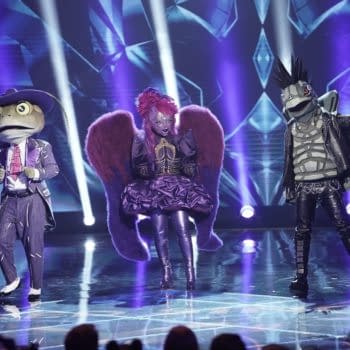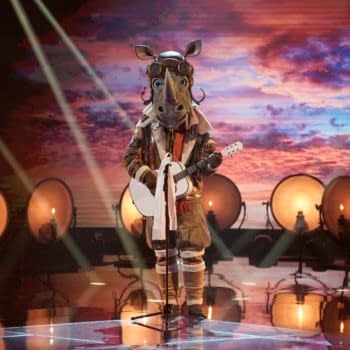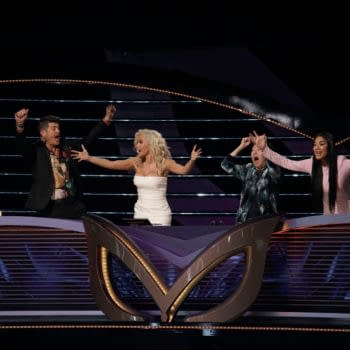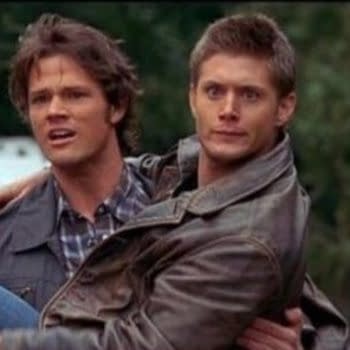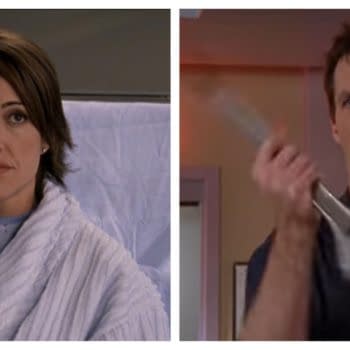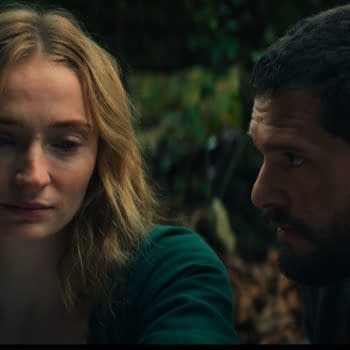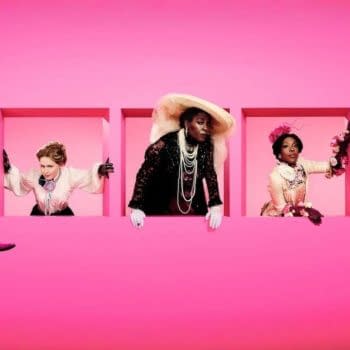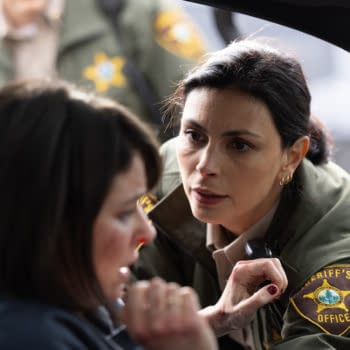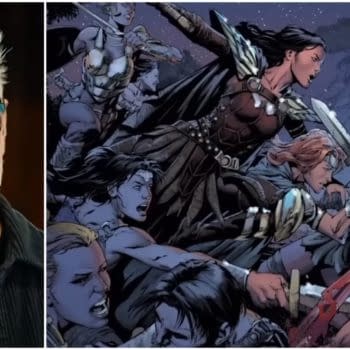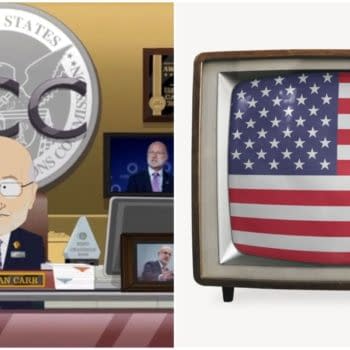Posted in: TNT, Trailer, TV | Tagged: Black Dahlia, books, cable, chris pine, connie nielsen, Fauna Hodel, george hodel, golden brooks, History, i am the night, India Eisley, interview, Jay Singletary, Jefferson Mays, Jimmy Lee, Justin Cornwell, LA, LeLand Orser, limited series, los angeles, mini series, Mystery, novels, patty jenkins, streaming, suspense, television, thriller, tnt, tv, Yul Vazquez
'I Am the Night': Jefferson Mays on Getting Inside George Hodel's Mind [SPOILER INTERVIEW]
The last two episodes of TNT's bone-chilling mini-series I Am the Night have been particularly illuminating, increasingly disturbing and eerily captivating. Jay (Chris Pine) and Fauna (India Eisley) begin working together to uncover George Hodel's (Jefferson Mays) deepest and darkest secrets. They find themselves in grave danger, the closer they get to the truth.
While we fear for Fauna and Jay's safety, we are also perplexed by George's inexplicably bizarre, vile and morbid excentricities. He throws lavishly perverse parties, terrorizes mob bosses and law enforcement, and ingeniously manipulatives circumstances to his lurid desires. George Hodel, his mansion, and his historical infamy surpass creepiness.
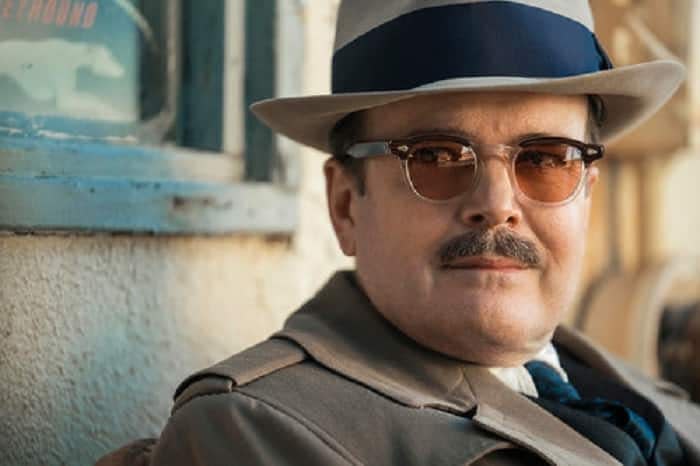
In our interview, Mays explains the symbolism showcased throughout the series, describes how it felt filming incredibly unnerving scenes, and discusses the callus ambiance and intentional fortitude of Sowden House.
I'm fascinated by George Hodel's collection of art. Was it Salvador Dali that he displayed in his collection?
He loved the surrealists. I'm not sure if he had any actual Dali in his collection, but certainly, some Dali-like art is represented.
Okay, because that moment where Jay puts it together and he visualizes the photos from the crime scenes and the dismemberment reflected in the artwork – it's like George fancied himself a surrealist artist except with murder, allegedly. Although all fingers sort of point to him even after 70 years. So I'm curious about the importance of art and the role it plays in the narrative.
Yes. He was raised as a child prodigy. One of his tutors was Rachmaninoff himself and he was raised to be a concert pianist. There's a primal scene with young George in episode 6 where Rachmaninoff turns to his mother and says, "The boy is an expert technician, but he'll never be an artist."
So I think that's what the series focuses on and correctly intuits about the character/persona of George Hodel – that he was, in fact, a frustrated artist. The curse of George Hodel, or the tragedy of him, was – with the critical facility and intelligence – an artistic temperament to be aware of his own mediocrity. He knew enough to know he wasn't any good and wouldn't amount to anything, as an artist. I think that fuelled this sort of discontented rage throughout his life. This disappointment.
I think a lot of child prodigies if they grow to adulthood, they experience that to greater or lesser degrees.
Right because they peak so young.
They just start early. That's the only thing that distinguishes them. They have an immediate and quick aptitude and then they become like everybody else – I mean – who are able to practice and catch up to them.
I think George never really recovered from that. Fancy themselves as genius unfulfilled.
I suppose that's why he likes having Sepp (Dylan Smith) as his protege because he belittles Sepp too. The more he tries to gain George's approval, he's paying it forward and demeaning Sepp saying he's not good enough.
Yeah. He was bullying. So you can understand how it was really unpleasant to play him for several months.
Absolutely! That and reading all of the horrible things his son wrote…
Yeah. Or the descriptions of the crimes he was suspected of. He wasn't even convicted in the incest trial so he got off scot-free, but there is no question in my mind that he was a sick ticket. Whether or not he committed any of these murders.
A very sick ticket! Fauna learns the gut-wrenching truth in Episode 5. She's just warned not to go there. We fear the worst. That one flashback with young Tamara and the eye contact George maintains with her – that's the moment you go, "Oh no! This isn't going to go where we think it is. Is it?" And then it does when you get to "Aloha."
Yes, that was a very odd scene to film, as you can imagine.
Right?!? And what was he wearing on his head???
That was a bull – it figures as a motif throughout- as it did with a lot of surrealist art. I think Picasso was obsessed with the bull being a symbol of masculinity. In Greek myth, the Minotaur – half man, half bull – in King Midas' palace. So that was a sort of sculpture made into a bull-like mask.
Okay. Then there's that moment when he peers under the door and sees hooves. For a second, because he is such an eccentric character, you wonder: does he actually have a bull in his mansion or is he just imagining it?
Right. I think the bull is in his mind. I think it's symbolic of the monster that is pawing away within him. That he is barely able to and ultimately unable to suppress.
One of the things that I love about this series is it exists on a largely mythic level. Fauna's is on a Joseph Cambellian hero's journey to discover her mother and father and her origins. It's right out of epic literature and Ancient Greece. It's such an ancient story, isn't it?
It is. Especially when you say that George considers himself like a god. That goes into Greek Mythology – god and humans, their offsprings not knowing who or what they are, feeling like freaks of nature.
Yes and often born of incestuous relationships with sister or brother gods. I think he put himself in that sort of pantheon – as a raging narcissist.
Do you think it is true? Was it ever proven that Fauna is his?
It was never proven. This is all supposition. I was reading his early writings and a lot of literature that inspired him as a young man. It was all – for instance, the Surrealist Manifesto of Andre Breton which is an exaltation for us to scruff off the veil of convention and get in touch with our dream life, our subconscious. It was this hero's journey that he fancied himself on in which he was breaking the bounds of society and exploring what it truly meant to be human and to engage with the world. It was very grandiose and adolescent – and was so throughout his life.
He loved the of Edgar Allan Poe and Baudelaire and Andre Breton and fancied himself this explorer who was untethered by social norms and had free license. I think this allowed him to experiment in strange and illegal ways.
He always thought he was dreaming everything. In the incest trial, he said, "You tell me I did these things but I don't remember having done them. But I remember the feeling of being hypnotized or perhaps in the act of hypnotizing someone else but it all seems a dream."
A lot of serial killers live in that strange world, straddling the line between reality and dream.
Yes. Good and evil, too. It's interesting because Chris Pine's character, Jay, is haunted too. He's no innocent either. He battles his own demons. Even he has darkness within him that he fights. There's a fascinating parallel between Jay and George.
That's true. I hadn't thought of that. But he's sort of a man torn apart between his good self and bad self. George has pretty much gone over to the dark side. Unabashedly and with a clear conscience.
Yes and with a sense of entitlement. Like it's his right to be that way. People are his playthings. Everyone is his puppet too. He has control over the police and mob ties. People are afraid of him. How can one person instill so much fear in all of these authoritative figures around him? You think it would be easy to take one person out. How did he have so much power?
He offered them something they desperately needed.
The abortions…
Yes. He allegedly performed them for prominent members in politics, the motion picture industry, and the police force. He was necessary to them. And then invited them to machiavellian parties or whatever they were. He made himself indispensable to them. And knew so much about them.
His IQ was 186. He was a part of a very early study of gifted children and he was a genius. I think that coupled with his narcissism made him a master manipulator of people.
Did you film in his actual house? It's become a historic monument in Los Angeles. What was that like?
It was a revelation. It's the most singular place…built in 1926… When I went inside I immediately realized that it is the ideal architecture for a control freak. It's almost a prison. All the rooms are cell-like, arranged around a central courtyard. So you sort of feel captive there. The walls are so thick, you can't hear a sound from outside. And it feels like a Panopticon – one of those 18th-century prisons where the warden can stand in one and have a complete view of the goings-on everywhere else. If you stand on the balcony, you can command the view of Franklin Ave. without being seen. And of course, it has a room behind a bookcase, which seems almost cliche. Like an evil genius' lair. And then he had a sort of basement operating room where he could perform abortions, presumably. So it feels like a lair of an archvillain.
Yeah. Did it feel haunted?
You know what, I went in there prepared to feel at home in the place, so I didn't feel any bad vibrations from it. It was odd and intriguing, but I didn't feel it was necessarily evil.
Okay. You just feel like there would be the echoes of all the negativity reverberating off the walls.
Yes. There was a homeless person who came up the alley years ago, decades ago, who came and described the interior of the place to the homeowners in great detail. It was the interior that matched what is during George's time there and she said, "This is an evil place. Evil things go on here."
Ooooh. Very chilling.
I think the house is another character.
Definitely, because it is very striking too. The aerial shot of the house – you can see exactly what you described.
Yeah, those drones are very useful. I remember it was 3 o'clock in the morning and they sent it 400 feet above the house to get that wonderful shot.
It is a wonderful shot. What was the most fascinating thing that you found in all of your research? What was the most striking or something that would be unseemingly important or surprising for people to hear?
That would surprise people…that's a good question. I think the thing that made no sense to me was the thing that I told you about his describing this dream state he was in – in which he didn't know what was real and what was a dream. That was, for me, where I tried to have George live – in the shadows of a dream. That made it somehow bearable for me and at the same made a great deal of sense – if you're perceiving the world as a dream that you're moving through, you relinquish all culpability.
Catch the suspenseful finale of I Am the Night on Monday, March 4 at 9 p.m. EST on TNT.







